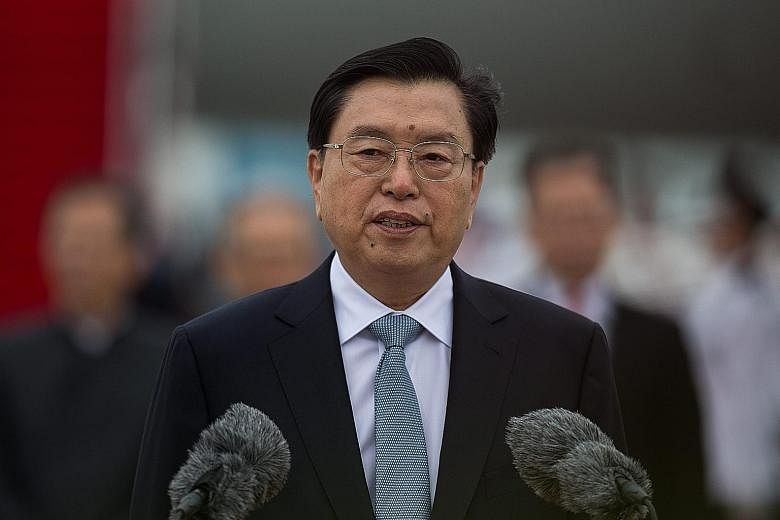China's No. 3 leader Zhang Dejiang was sent to Hong Kong last week to help smooth over the angsty relationship the city has with the central government in Beijing.
His key tasks were to assess whether Beijing should back the city's unpopular leader Leung Chun Ying for a second term, and to help unite the pro-establishment coalition.
Mr Zhang wears other hats - he is chairman of China's Parliament and also responsible for Hong Kong and Macau affairs - but his role as troubleshooter is something he has become known for in recent years.
In 2012, Mr Zhang, then Vice-Premier, was sent to hold the fort as interim Chongqing party chief after Bo Xilai was removed from the post and subsequently expelled from the Chinese Communist Party (CCP).
But this was not the case about a decade earlier, when trouble seemed to dog him like a shadow.
When he was party chief of Guangdong province from 2002 to 2007, he was blamed for allegedly covering up the Sars outbreak.
The Sars virus, which infected 8,096 people and killed 744 worldwide, first emerged in Foshan city around November 2002, soon after Mr Zhang became Guangdong party chief. He reportedly ordered a media gag on coverage of the Sars outbreak, despite growing worries about the virus.
This was because the provincial authorities did not want any bad news to affect people's spending during the Chinese New Year holidays at the end of January 2013.
Mr Zhang's tenure in Guangdong also saw a rise in "mass incidents" - a Chinese euphemism for riots, demonstrations and protests - which hit 87,000 cases in 2005, up 6.6 per cent from 2004 and 50 per cent over 2003.
In December 2005, security forces opened fire on crowds protesting against the construction of a power plant.
The official death toll was three but residents said up to 30 people were killed.
When he was a vice-premier from 2007 to 2012, Mr Zhang also came under fire for mishandling rescue efforts after a train crash in Wenzhou, Zhejiang province, in 2011.
But Mr Zhang, 69, is a political survivor. In 2003, he escaped official censure while the health minister and Beijing mayor were sacked for covering up the Sars outbreak.
In 2012, he became the third-ranked member of the CCP's seven-member decision-making Politburo Standing Committee (PSC), and also chairman of the National People's Congress, or Parliament.
Observers said Mr Zhang was helped by his links to former president Jiang Zemin, which can be traced back to 1990, when Mr Jiang first visited North Korea as the CCP's general secretary.
Mr Zhang, a native of north-eastern Liaoning province, has also taken on important roles under Mr Xi Jinping's leadership since 2012. He is deputy chairman of the National Security Commission, and heads the Central Leading Group on Hong Kong and Macau affairs.
After studying the Korean language at Yanbian University in north-eastern Jilin's Yanji city from 1972 to 1975, Mr Zhang worked as a party official at the university until 1978. He then studied economics at Kim Il Sung University in Pyongyang and graduated in 1980.
Mr Zhang, whose father was reportedly former People's Liberation Army major-general Zhang Zhiyi, spent his early political career in Jilin, which borders North Korea, before he was appointed Zhejiang party boss from 1998 to 2002.
His latest troubleshooting mission could be one of his toughest yet. First, time is not on his side as he is due to retire from the PSC next year.
Second, he is seen as an ultra-conservative - a result of his past crackdowns on protesters and media - which does not go down well with Hong Kongers, who value freedom of speech and assembly.
More importantly, many Hong Kongers blame him for covering up the Sars outbreak. Hong Kong lost 299 people to the deadly virus.

